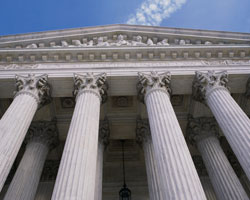U.S. Federal Court System
The Federal Court System in America
 The Federal Trial Courts In the federal court system, the trial courts are called U.S. District Courts. The jurisdiction of the federal courts has been established by Congress, consistent with the provisions of the U.S. Constitution. The federal district courts have jurisdiction over cases involving the interpretation of federal statutes, or of constitutional provisions, and also have what is known as “diversity jurisdiction,” where the parties are from different states and there is a minimum dollar amount at stake.
The Federal Trial Courts In the federal court system, the trial courts are called U.S. District Courts. The jurisdiction of the federal courts has been established by Congress, consistent with the provisions of the U.S. Constitution. The federal district courts have jurisdiction over cases involving the interpretation of federal statutes, or of constitutional provisions, and also have what is known as “diversity jurisdiction,” where the parties are from different states and there is a minimum dollar amount at stake.
There are federal district courts in every state, as well as the U.S. territories of Guam, the Virgin Islands and the Northern Mariana Islands. Most federal district courts are courts of general jurisdiction—they may hear cases involving most civil matters. There are, however, two special trial courts that have nationwide jurisdiction over certain types of cases. The Court of International Trade addresses cases involving international trade and customs issues. The Court of Federal Claims has jurisdiction over most claims for money damages against the U.S., disputes over federal contracts, unlawful “takings” of private property by the federal government and a variety of other claims against the U.S.
Because bankruptcy petitions are filed under the federal bankruptcy code, the federal courts also have exclusive jurisdiction of all bankruptcy matters. The Federal Appeals Courts The 94 federal judicial districts fall into twelve regional circuits, divided geographically. The federal appeals courts hear appeals from all district courts within their circuits, as well as appeals from the decisions of federal administrative agencies. In addition, the U.S. Court of Appeals for the Federal Circuit has nationwide jurisdiction to hear appeals in specialized cases, such as those involving patent laws and cases decided by the Court of International TradeCourt of Federal Claims. The United States Supreme Court The United States Supreme Court consists of the chief justice and eight associate justices. A case may be appealed from state or federal court to the U.S. Supreme Court. The court, however, has considerable discretion regarding which cases it will review on appeal, as established by Congress. Under the U.S. Constitution, the Supreme Court also has original jurisdiction (meaning it may be the first court to hear a case) in matters affecting “ambassadors, other public ministers and consuls, and those in which a state shall be a party.” The Independence of the Federal Judiciary Federal courts often are called the guardians of the Constitution because their rulings protect rights and liberties guaranteed by the Constitution. Through fair and impartial judgments, the federal courts interpret and apply the law to resolve disputes. The courts do not make laws; that is the responsibility of Congress. The courts also do not have the power to enforce laws; that is the role of the president and the executive branch departments and agencies. All federal judges are political appointees, named by the President of the United States.
The Constitution promotes judicial independence in two ways. First, federal judges are appointed for life and may be removed from office only through impeachment and conviction by Congress. Second, the Constitution provides that the compensation of federal judges “shall not be diminished during their Continuance in Office,” which means that neither the president nor Congress may reduce the salary of a federal judge.
Connect with Top-rated Attorneys Near You
Sponsored Advertisement
Other Lawsuits and Disputes Topics
Latest Article
The Exclusionary Rule: Definition, Examples, and Impact
What Is the Exclusionary Rule? What Are Common Situations Where It Applies? Are There Exceptions? How Has It Changed Cri... Read More
False Imprisonment: Protecting Yourself Against Wrongful Detention
What Is False Imprisonment? What Are the Potential Remedies? Are There Exceptions to the Rule? As humans, one of our mo... Read More
Lying Under Oath: The True Penalty for Perjury
What Is Perjury? What Must the Prosecutor Prove? What Are the Penalties? In the legal system, oral and written testimon... Read More
GETLEGAL®ATTORNEY DIRECTORY
Find Leading Attorneys in Your Area
NEED PROFESSIONAL HELP?
Talk to an Attorney
How It Works
- Briefly tell us about your case
- Provide your contact information
- Choose attorneys to contact you





